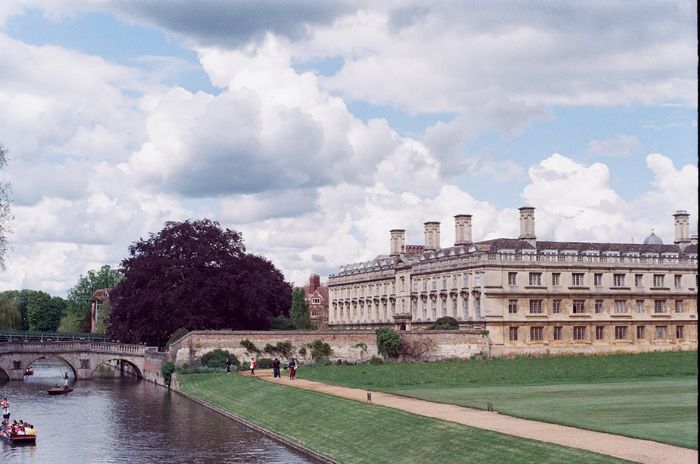Plays and playing truant: Stephen Fry’s Cambridge
Emily Cushion recounts the rebellious days of Stephen Fry’s time at Cambridge

Walking into a third sixth-form college, following two expulsions, Stephen Fry told the vice-principal, “I will be given a place to read English at Queens’ College. If you take me on, that is what will happen”. Despite two of his requested courses being full, Fry was admitted, and in 1978 the actor/writer/comedian arrived in Cambridge “with a collection of carefully chosen books, a typewriter, a gramophone, a pile of records, some posters and a bust of Shakespeare.” As is evident from his declaration to the vice-principal, for Fry, “it was Cambridge or nowhere”.
“Fry himself admits that ‘I went to three lectures in my entire three years’”
Upon reading The Fry Chronicles and Moab is my Washpot two autobiographies comprehensively covering Fry’s university years, it became increasingly clear to me that the Cambridge of the late 1970s is worlds away from the one I currently find myself in. The university has predominantly been defined by its demand for academic excellence over the course of its 800-year history; Fry, however, seemed far less burdened by his degree than most current students. He himself admits that “I went to three lectures in my entire three years.”
Fry’s self-liberated timetable thus makes us question what we might do if we didn’t have to study all day. Perhaps we can get some ideas from him: “the natural thing to do was to talk a lot, listen to music, drink coffee and wine, read books and go to plays.” While these activities do not convey studying in the strictest sense, they ultimately contributed to Fry’s cultural upbringing – indeed, most Cambridge students similarly benefit from the town’s rich cultural history. Fry experienced the same kind of liberation throughout his engagement in student theatre – “The beauty of our way was that everyone was learning as they went along.” Such a welcoming environment encouraged the blossoming of talents such as Emma Thompson and Hugh Laurie, both in Fry’s year at Cambridge – by the end of their university experience, the three had become unalterably close.
“‘Wine can be a wiser teacher than ink, and banter is often better than books’”
Fry remains convinced that his pursuit of extracurriculars and connections at Cambridge was the optimal route to go down: “Wine can be a wiser teacher than ink, and banter is often better than books.” Despite this, he still managed to achieve a 2:1 (which he claims was “dull, worthy and unexciting”), with firsts in all of his examined papers. Fry therefore stands as testament to the fact that prioritisation of non-academic fields is possible, and indeed preferable, even in a university like Cambridge.
Fry’s autobiography highlights how Cambridge is at once forever constant and forever changing: “while the chapels and colleges, courts, bridges and towers are what they have always been, Cambridge is entirely different each time.” The city is situated as both temporary and timeless; its architecture and cultural history render it frozen in time, while it is the constant transformation of its students that brings Cambridge to life, always directing it towards something currently unknown.
For current students, making an impact on a city already so influential to history, culture and art seems an insurmountable task, but Fry certainly left his mark on the town; we all have the potential to do so. Indeed, it was during his last performance as a Cambridge Footlight that Fry and Laurie both got scouted by an agent, kickstarting their comedy careers before they’d even left the town: “The silhouette of King’s College chapel loomed up against the night sky. “I’ve got an agent!” I told it. It was unmoved.” Cambridge undeniably changed Fry’s life, while remaining itself unchanging; the town is thus a catalyst for greatness, waiting patiently to welcome its next young prodigy - the “flushed youth, pampered youth, privileged youth, happy youth,” as Fry suggests.
Like me, Fry grew up in Norfolk (and is similarly ambivalent about the fact). He even briefly attended the sixth-form college I took my A-levels in, though in his time it was an all-boys grammar school. As a fellow English student (and fan of Oscar Wilde), I take great inspiration from Fry’s path to Cambridge, and the subsequent success he achieved from making the most of that experience. Fry believes everyone can get something different out of the university – “There were a lot of Cambridges, I am just trying to remember mine” Perhaps we would all benefit from making the most of Cambridge in all its facets – we might as well try to have an experience worth writing an autobiography about.
Want to share your thoughts on this article? Send us a letter to letters@varsity.co.uk or by using this form
 Comment / Cambridge students are too opinionated 21 April 2025
Comment / Cambridge students are too opinionated 21 April 2025 News / Candidates clash over Chancellorship25 April 2025
News / Candidates clash over Chancellorship25 April 2025 News / Cambridge professor paid over $1 million for FBI intel since 199125 April 2025
News / Cambridge professor paid over $1 million for FBI intel since 199125 April 2025 News / Zero students expelled for sexual misconduct in 2024 25 April 2025
News / Zero students expelled for sexual misconduct in 2024 25 April 2025 Comment / Does the AI revolution render coursework obsolete?23 April 2025
Comment / Does the AI revolution render coursework obsolete?23 April 2025






